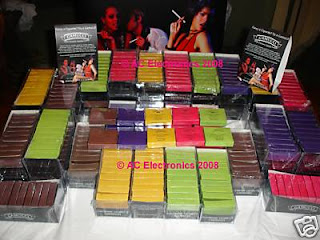
The only thing more aggravating than being told by a nonsmoker that "smoking is bad for you" is being taunted with offers to go outside by a cigarette-waggling co-worker halfway through your first week of quitting smoking.
"Wanna come out for a smoke?"
Yes, you evil spawn of Satan. I do.
If you can make it through that delicate time without trying to strangle someone with the smoke ring he just blew in your face or giving in and having "just one," you're golden.
But that's the hard part.
On Tuesday, the FDA unveiled the graphic photos that will become part of cigarette warning labels starting in 2012. Yesterday was also my three-month "quitiversary." I felt fortunate that the new labels weren't something I'd ever interact with on a regular basis — but I was reminded how difficult shaking addiction is.
Someone who has never smoked doesn't understand the struggle, and someone who smokes has never really quit. It's a lonely process.
Addiction to cigarettes is funny that way. How it convinces you that it's your friend. How it truly makes you believe that while you need to go have a smoke you simultaneously aren't addicted. You can quit anytime you want. But, why would you? Smoking is fun!
Any smokers who say they aren't addicted are lying to themselves. Some people, mostly smokers, have disagreed with me on that. I've heard and used many excuses for not quitting — making friends, oral fixation, general anxiety — and while I'm not an expert or anything, I've been on both sides of this now. It wasn't the social life that kept manipulative little happiness-stick tucked between my middle and pointer finger.
Three months ago yesterday, I literally and figuratively flicked my last cigarette. The day had been looming for a while. I wasn't going to leave college and Lincoln, Neb., as a smoker. Mental preparation had started months before, and I'd become used to the idea of quitting. After a while there simply wasn't any question. It was like anticipating my 25th birthday — as much as I dreaded it, it was a simple reality.




 id="BLOGGER_PHOTO_ID_5620249728032245650" />
id="BLOGGER_PHOTO_ID_5620249728032245650" />


